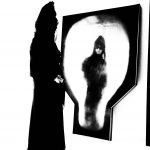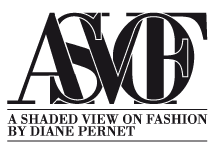Dear Shaded Viewers,
My friend Miguel Villalobos introduced me to the work of Hiroyuki Ito. Actually he sent me a link to an article about him in the New York Times. I found it quite intriguing, hence this interview.
DP: How do you explain the emotion that comes through in your photos when you say that you take pictures with no emotion and almost mechanically?
HI: Emotion is wrung out in the darkroom. When I am photographing, I am simply collecting. I can't afford to linger in one moment, then I'll lose another. But the seeds of emotion are planted in negatives, so I deal with them later when printing. Another theory is that it's the viewer who projects his emotion to the photograph. But the picture itself doesn't have any emotion.
DP: Something must draw your attention to your subjects, like for instance what made you lift up your camera when you shot the black and white photo with the woman with the white hair?
HI: If you've seen the work of Ed Ruscha, it will be hard for you to pass by any gas stations without snapping a photograph. After I've seen the work of Ray K. Metzker, it was hard for me to see pedestrians coming in and out of shadows without clicking a shutter.
DP: Do you always work in black and white?
HI: I work in black and white and in color.
DP: You say that you don't know what you are after when you shoot yet everything seems to be perfectly framed, how do you account for that?
HI: Composition is a strong tool to communicate. So I don't go out of my way to deny it.

DP: You moved to New York almost half a life time ago, what inspired that move? Was it to go to the Tisch school?
HI: I came to NY to go to college. But, photography wasn't on my mind. I was attracted by its music scene like John Zorn, John Lurie, Arto Lindsay who used to play at the old Knitting Factory on Houston Street.
DP: How would you rank your level of curiosity, you say you are boring yet that does not correspond to the power of your work?
HI: I am not that curious. I am rather conservative. I am the type of a guy who goes to the same restaurant and orders the same food all of the time. I am afraid of trying something new.
DP: Have you been shooting since you were a little kid?
HI: I took a photography class in college. I had no interest before then.
DP: When did you first pick up a camera? What did your first image look like? Once you started to shoot, I take it that you never stopped.
HI: Taking pictures and documenting our lives weren't big on my family's agenda. I don't think we owned a camera. I don't remember the first image that I took. It all started after I moved to New York.
DP: Your approach is the opposite to that of Henri Cartier-Bresson who was most known for his search for the decisive moment, yet there is something in your work that makes me think of him? What are your thoughts on the father of modern photo journalism?
HI: I've heard his name before. He was an ex-photographer even before he died. Two thumbs down. For the same reason, Robert Frank and William Klein go down the toilet. These three are quitters. Look at Lee Friedlander or Daido Moriyama who still go out and take obnoxious amounts of bad pictures. They refuse to be canonized but keep shooting. They are, to me, more interesting. But I'll be honest. I love Cartier Bresson. I love Frank and Klein. Who doesn't?
DP: Who are your favorite photographers and filmmakers? Authors?
HI: Films by Hou Hsiao-Hsien have left big impressions on me. Especially "Cafe Lumiere." Philip Guston's late paintings are fascinating.
DP: Are you still contributing to the Village Voice and how did you get that job in the first place?
HI: No, I got the internship right after my graduation from NYU.
DP: Are there any particular subjects that interest you or if not interest you, that you find reoccur frequently in your work?
HI: Women.
DP: Are you drawn to the mystery of picking up a roll of film out of your vegetable drawer, do you think that the surprise element is important to your work?
HI: Not really, but with the film, it's a relief not to be able to look at images right after you took them. That will be like watching yourself having sex on video right after you had sex. Why go through it twice? Didn't you come yet?
DP: Do you ever cook and if so what do you like to eat?
HI: I am a terrible cook. I make rice and miso soup. That's about it.
DP: Do you have a routine, like going out late at night or early in the morning with your camera?
HI: I go out anytime. But I am not a nocturnal creature. I prefer to take a walk under the sun.
DP: Before you moved to New York 17 years ago, were you photographing? Has your approach to taking pictures changed much over the years?
HI: First question, no. Second question, yes. I wanted to be a good photo journalist, I guess. I failed.
DP: As you document your everyday life would you ever consider putting together a book?
HI: I would love to. That's my goal.
DP: Is your life concentrated on photography or are their other arts that you practice?
HI: I think so. I would like to find other distractions.
DP: What keeps you in New York as opposed to going back to Japan?
HI: I want to take more pictures in New York. But it will be interesting to move back to tokyo to take pictures.
DP: How did the New York Times discover you and your work?
HI: I have been freelancing for them since 1999. I showed my portfolio and they started to give me assignments one by one.
DP: Do you think that the idea of mystery, the mystery of life, the mystery of what images are on the film, plays into the dynamic of the way you work?
HI: There isn't a mystery in life. Everything is clear as a parking sign.
DP: Can you imagine yourself doing anything other than photography? Is that what feeds you?
HI: I love drinking tea and talking with friends all day. I wish somebody would pay me for that.
DP: What is in your vegetable drawer right now? Do you like to cook?
HI: One avocado. Not into cooking.
DP: Do you feel that the fact that you are not from NYC has anything to do with the way you view what is in front of you on a daily basis? Do you enjoy the distance of always being from somewhere else?
HI: I have a feeling that I would be taking the exact same pictures whether I was in New York, Tokyo or on Neptune. Being a foreigner is a curse and a blessing at the same time.
DP: Do you imagine that you will stay in NYC for the rest of your life?
HI: No, but every New Yorker says no and then gets stuck here, right?
DP: If you were not doing what you are doing now, what would you dream to do?
HI: It would be nice to be beautiful and just exist.
DP: What do your walls look like? Do you make a collage of what you shoot as a document of your life?
HI: Good question! Nothing on the walls. Absolutely nothing. Hate to see images around me. I don't want to see anything at all!
Thank you.
Later,

Diane Pernet
A LEGENDARY FIGURE IN FASHION and a pioneer of blogging, Diane is a respected journalist, critic, curator and talent-hunter based in Paris. During her prolific career, she designed her own successful brand in New York, costume designer, photographer, and filmmaker.
